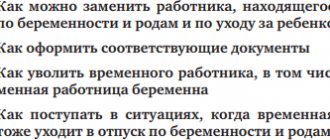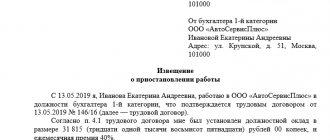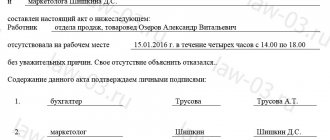Why do you need an explanatory note?
An explanatory note is a document that, in accordance with Art.
193 of the Labor Code of the Russian Federation, the employer must ask the subordinate before imposing a disciplinary sanction on him in the form of a reprimand, reprimand or dismissal. The employee must provide an explanation to the employer within 2 days from the date of request. The concept of “lateness” is not directly disclosed in the Labor Code of the Russian Federation. However, it may well be qualified as a violation by the employee of his duties and serve as a reason for disciplinary action, since in accordance with the provisions of Art. 189 of the Labor Code of the Russian Federation, the employee’s responsibility is to comply with internal regulations, which, in particular, fix the work schedule.
The essence of an explanatory note about being late for work is to familiarize the employer with the reasons that led to the employee committing an offense. The provision of an explanatory note in itself does not guarantee the subsequent release of the employee from the disciplinary sanction provided for by the Labor Code of the Russian Federation. But the employer is obliged to take into account the facts that are set out in it in order to assess the proportionality of the offense and the disciplinary measures subsequently applied. The employee may not provide the employer with an explanation, but in this case the company has the right to apply disciplinary action to him.
If the employee does not provide an explanatory note, he must be notified of the need to draw up such a document.
Find out how to notify an employee about the need to give written explanations in ConsultantPlus. If you do not have access to the K+ system, get a trial demo access for free.
Being late as a violation of discipline
When hiring a new employee, the employer enters into an employment contract with him and introduces him to the internal labor regulations (ILR) against signature. PVTR introduce working hours at the enterprise. If an individual regime is provided for an employee, this is stated in the employment contract (Article 100 of the Labor Code of the Russian Federation).
Working time is the period during which an employee is obliged to perform his official duties (Article 91 of the Labor Code of the Russian Federation).
Being late is a violation of working hours and labor discipline. In this case, management has the right to apply disciplinary action.
Explanatory note for being late: document structure
What an explanatory note should look like is not regulated by the Labor Code of the Russian Federation or other federal regulations. But if you follow business practice, you can draw up a document with the following structure:
- Date of preparation;
- title - “Explanatory note”;
- information about the originator of the note and to whom it is addressed;
- a text block with explanations regarding the offense;
- FULL NAME. and the employee's signature.
In the upper left part of the document you can indicate the name of the structural unit in which the note writer works. Information about the recipient (full name and position of manager) is recorded in the upper right part of the document.
Below in the center is the title of the document. Preferably in capital letters, font 2-4 sizes larger than the main one.
The next element of the explanatory note is a text block explaining the reasons for being late. It can rightfully be considered the most important, because it is he who determines what the employer’s reaction to the misconduct will be.
How to write an explanatory text?
The explanatory note should reflect:
- the exact dates and times of the employee’s actions to which he refers, the events in which he participated;
- reasons that directly predetermined being late for work.
When writing a note, you should adhere to a formal business style.
Regarding the first point, it is recommended to clearly write that we are talking about being late, as well as for what period of time relative to the work schedule. You should not write phrases like “showed up for work a little later than usual.”
When talking about the reasons recorded in the explanatory note about being late for work , it is advisable to let the employer see the root of the problem. The fact that a person overslept can be due to a variety of reasons. The fact that there was construction work going on outside all night and it was very noisy is one thing; participating in a gaming tournament on the Internet until the morning is completely different.
What is the optimal length of an explanatory note?
There are different points of view regarding the volume of the explanatory text block. Some believe that the document should state as briefly as possible the facts relevant to the offense. However, there are those who believe that the employee should disclose information about the reasons for being late in as much detail as possible so that the employer can make an unambiguous decision about whether it is worth applying disciplinary action or whether it is possible to get by with an oral suggestion, or even recognize the reason for being late as valid.
It is fair to believe that everything depends on the specific situation. For example, if an employee was late for work because he missed the bus, metro or train, it is appropriate to explain exactly why this happened. The reasons for being late due to the fact that the door lock in the apartment was jammed and because the alarm clock was not set differ in terms of assessment of respect, although they led to the same result. Therefore, in this case, it makes sense to detail the story.
In turn, if the bus simply did not reach the line on schedule, special details will probably not be needed here - an indication of the very fact that the transport schedule was violated will be sufficient. But in this case the employer will probably want to ensure that this was indeed the case. In this regard, the employee may have to accompany the explanatory note with additional sources confirming the stated facts.
What can they be and how should they be provided to the employer?
Disciplinary action under the Labor Code of the Russian Federation
Art. 192 of the Labor Code of the Russian Federation establishes the types of disciplinary sanctions:
- comment;
- rebuke;
- dismissal.
The application of other punishments for disciplinary offenses is not provided, but some legislative acts introduce penalties for certain categories of employees. For example, a severe reprimand for military personnel, transfer to a lower position for police officers.
The choice of sanction for an employee depends on:
- the severity of the offense;
- the circumstances of its commission.
Is it possible to deprive a bonus for a disciplinary offense? Read the material.
Useful information from ConsultantPlus
The Supreme Court of the Russian Federation summarized judicial practice for 2021 - 2021. in disputes related to dismissal at the initiative of the employer. See the Review approved by the Presidium on 12/09/2020.
Additional documents confirming a valid reason for being late
To confirm that the reason for being late is valid, the employee can attach additional documents to the note directly with the note “I am attaching the following documents.” Or you need to refer to the possibility of providing them at any time at the request of the employer. A similar document could be a receipt with a fine issued by a traffic police officer who stopped a person who was late for work for a violation (the employee had to spend time filing the appropriate penalty).
The evidence base in this case can also be electronic sources, for example, video recording on a phone, broadcast from public web cameras or news reports, if the reason for the delay is related to a delay or failure of the vehicle to arrive on schedule due to bad weather. It may also be appropriate to post the relevant content on a cloud service and include a link to download or view it in the explanatory note.
What you have no right to punish for
There is a list of reasons that are considered valid. These include:
- illness of the employee himself or his close relative;
- going to a medical facility or other government organization;
- emergency;
- participation in government processes (in court);
- utility accident (pipe burst);
- force majeure situations that do not depend on the will of the employee (for example, an elevator breakdown or a delay in a transport flight).
In fact, the list of valid reasons for being late is not defined by regulatory documents. The employer himself decides in each specific case whether the reason for the employee’s delay is valid or not (see letter of Rostrud dated October 31, 2008 No. 5916-TZ, ruling of the Constitutional Court dated October 17, 2006 No. 381-O).
If you are late for one of the reasons listed, write so in your explanatory note. The employer will consider your explanation and make a decision. Most likely, disciplinary measures will not be taken against you. But keep in mind: a valid reason must be documented. For example, if the reason for being late is a visit to a medical facility, attach a certificate from a doctor to the explanatory note, and in the event of a utility accident, a certificate from the housing office. Otherwise, the punishment is justified.
How is the receipt of the explanatory note verified by the employer?
It is advisable to document the fact that the explanatory note was received by the employer - this is in the interests of both parties to the employment contract. The Labor Code of the Russian Federation only says that the employer should record by drawing up an appropriate act the fact of failure to submit an explanatory note. But, as practice shows, following this norm may not be sufficient.
For the employer, receipt of an explanatory note is confirmed by its actual presence. The main thing is that it is not lost: if an employee decides to prove in court or to the Labor Inspectorate that the reason for his lateness is valid, the employer must be able to present the relevant document to the court. If it gets lost, you can request a new one only if no more than a month has passed since the delay occurred (paragraph 3 of Article 193 of the Labor Code of the Russian Federation).
As for the employee, it is important for him to be sure that the employer will not subsequently draw up an unlawful act of failure to provide an explanatory note, pretending that he did not receive it. Therefore, when transferring this document to the personnel service, the employee should ask the secretary or personnel officer to make a copy and put a mark of receipt on it.
Another option is to include an additional element in the structure of the explanatory note - a block with the wording “Received”, “Accepted” or “The document has been reviewed” indicating the full name. and the position of the employee who accepted the document. In this case, the explanatory note should be printed out in 2 copies, after which the signatures of the employee and the personnel department should be affixed to each of them.
Arbitrage practice
A dismissed employee has the right to go to court and demand that the employer's decision be challenged. He must prove that the termination of the employment contract occurred illegally, for example, he was late for reasons that he had no control over and has the opportunity to prove it. If the court finds that the dismissal was illegal, the employee must be reinstated.
Attention! Disciplinary punishment can be lifted early if the employee has stopped violating labor discipline and has become more disciplined after the first reprimand.
Where can I get an explanatory note about being late for work?
You can download the form and sample explanatory note for being late, prepared by our experts, for free by clicking on the picture below.
There are situations when an employee refuses to give explanations about the reasons for being late. In this case, it is necessary to draw up an act on the employee’s refusal to give explanations regarding the violation of discipline.
ConsultantPlus experts explained in detail how to draw up such a document correctly and within what time it needs to be completed. To do everything right, sign up for a trial demo access to the K+ system and go to the HR Guide for free.
Results
An explanatory note about being late is an official document that is significant for both parties to the employment contract. By providing it, the employee gets a chance to avoid disciplinary action if the lateness was caused by valid reasons and they could be convincingly stated in the document. Failure to provide an explanatory note gives the employer the full right to impose a disciplinary sanction on the employee. It is important for the employee to make sure that the structure of the explanatory note is correct, and also to make sure that the employer has accepted it and that this has been documented.
For an employer, obtaining an explanatory note is important, firstly, because requesting it is an obligation prescribed in the Labor Code of the Russian Federation, and secondly, to maintain labor discipline in the team (a person who was once required to write a corresponding document will most likely try not to give reasons for receiving such orders again).
You can familiarize yourself with other documents used in personnel document flow in the articles:
- “How to write a report (rules, form, sample)?”;
- “Personnel documents that should be in the organization.”
You can find more complete information on the topic in ConsultantPlus. Free trial access to the system for 2 days.
If the delay lasts more than four hours in a row
A delay that lasted more than 4 hours is considered absenteeism. Absenteeism is understood as a serious violation of discipline and the employer has every right to dismiss a person even if he does not show up for work once.
Dismissal occurs according to the following algorithm:
- preparation of documents that confirm the fact of misconduct;
- preparing a dismissal order;
- familiarization of the violator with the order. Three working days are given for this .
Reference! Despite the fact that management has the right to fire an employee for absenteeism, in practice this rarely happens. Much more often, management confines itself to a written reprimand. Dismissal occurs in case of repeated violations or if previous disciplinary sanctions do not give the desired result.









